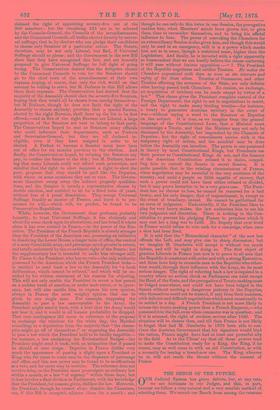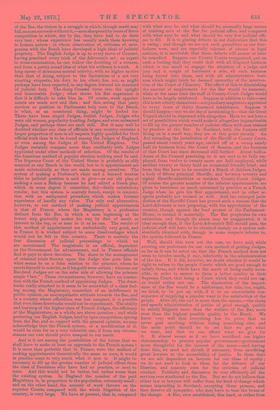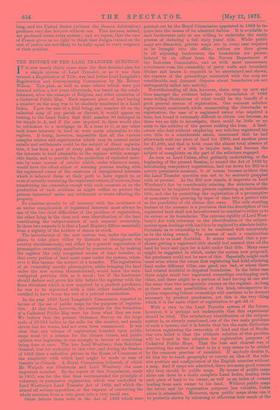THE BENCH OF THE FUTURE.
O1111 Judicial System has grave defects, but, at any rate, we are fortunate in our Judges, and this, in part, because we follow a very natural and a very sensible method of selecting them. We recruit our Bench from among the veterans
- of the Bar, the victors in a struggle in which, though merit may fail, no man succeeds without it,—men sharpened by years of fierce competition in which, day by day, they have had to do their very best; whose experience has usually made them knowing in human nature ; in whom observation of, criticism of, anta- gonism with the Bench have developed a high ideal of judicial propriety. The English Judge is up to every move of Counsel, having practised every trick of the Advocate's art ; an expert in cross-examination, he can follow the doubling of a witness, and form a pretty sound idea of what his evidence is worth. A long career of strenuous mental activity, with no higher motive than that of doing, subject to the limitations of a not very exacting etiquette, his duty to his client, has not, as might perhaps have been expected, in any degree lowered his standard of judicial duty. The sharp Counsel turns into the upright and honourable Judge ; what shows his Bar experience is that it is difficult to take him in. Of course, weak appoint- ments are made now and then ; and this, seeing that party services or position in Parliament help men to the Bench, is what, as an occasional thing, might be looked for. There have been stupid Judges, foolish Judges, Judges who were old women, popularity-hunting Judges, and even unlearned Judges, and perhaps there are such still. But it may well be doubted whether any class of officials in any country contains a larger proportion of men in all respects highly qualified for their official work than is to be found among the Judges of England, or even among the Judges of the United Kingdom. Our Judges certainly compare more than creditably with Judges appointed under other methods of selection. Of the results of the American method of popular election nothing need be said. The Supreme Court of the United States is probably as ably manned as any Bench in the world, but to it appointments are made substantially as they are made among ourselves. The system of making a Professor's chair and a learned treatise titles to judicial position is said to give—as our old plan of making a man a Bishop because he had edited a Greek play, which in some degree it resembles, did—fairly satisfactory results ; but this system is scarcely found, except in conjunc- tion with an antiquated procedure which makes forensic experience of hardly any value. The only real alternative, however, to our method of making judicial appointments is that of France, where the Magistracy is a profession distinct from the Bar, in which a man beginning at the lowest step gradually makes his way by dint of merit or interest to the top, or as near to it as he can. The results of this method of appointment are undoubtedly very good, and in France it is worked subject to some disadvantages which would not be felt in this country. There is scarcely the free discussion of judicial proceedings to which we are accustomed. The magistrate is an official, dependent on the Government for advancement, and in France officials find it pays to show devotion. The share in the management of criminal trials thrown upon the Judge also puts him in what seems to us a false relation to the prisoner, whom he exerts himself to convict, as if hisguilt were certain ; whereas our Bar-bred Judges err on the safer side of allowing the prisoner ample "law." These circumstances, however, have no connec- tion with the French method of appointing Judges. The draw- backs really attached to it seem to be somewhat of a class feel- ing among the Magistracy, somewhat of an indifference to public opinion, an unsympathetic attitude towards the Bar, and
in a country where officialism was less rampant, it is possible that even these drawbacks would not be experienced. The ability
and learning of the higher class of French Judges, the efficiency of the Magistrature, as a whole, are above question ; and while preferring our English Judges, bred by open competition, sprung from the Bar, and en rapport with the general opinion, we may acknowledge that the French system, or a modification of it, would be even for us a very tolerable one, if from any circum- stances our own should prove unequal to our needs.
And is it not among the possibilities of the future that we shall have to make at least an approach to the French system ? It is more than probable that in France, were the method of making appointments theoretically the same as ours, it would in practice come to very much what it now is. It might be necessary to fill up the greater number of judicial offices from the class of Barristers who have had no practice, or next to none. And this would not be better, but rather worse than the existing system. In England the number of the paid Magistracy is, in proportion to the population, extremely small ; and on the other hand, the amount of work thrown on the superior Courts, compared with the whole litigation of the country, is very large. We have at present, that is, compared
with what may be, and what should be, unusually large means of training men at the Bar for judicial office, and compared with what may be and what should be, very few judicial offi- ces to fill. It is to glaring defects in our Judicature that this is owing ; and though we are not such grumblers as our fore- fathers were, and are especially tolerant of abuses in legal matters, it is inevitable that these defects will sooner or later be remedied. Suppose our County Courts reorganised, put on such a footing that they could deal with all litigated business which is too small to engage the attention of a judge and jury and a couple of barristers a side, all such business being forced into them, and with all administrative busi- ness which might fairly be deemed unworthy of the interven- tion of the Court of Chancery. The effect of this in diminishing the amount of employment for the Bar would be immense, while at the same time the staff of County-Court Judges would have to be largely reinforced. Suppose in addition to this—and this is not utterly chimerical—a stipendiary magistrate appointed to every town of thirty thousand inhabitants. Suppose it should happen—but we are shy of mentioning it—that the Great Unpaid should be dispensed with altogether. Have we not here a set of possibilities which would make it altogether impracticable to fill up the greater number of judicial offices with men trained by practice at the Bar. In Scotland, with the Justices still living on in a small way, they are at this point already. An Act extending the jurisdiction of the Sheriff or County Court, passed about twenty years ago, carried off at a swoop nearly half its business from the Court of Session, and the business of that Court has since decreased still further. About half-a- dozen of the Counsel practising in it are said to be fully em- ployed, from twelve to twenty more are half employed, while another twenty or thirty hold an occasional friendly brief; and from this Bar have to be recruited a Bench of thirteen Judges, a body of fifteen principal Sheriffs, and between seventy and eighty Sheriffs-substitute or resident County-Court Judges. Of course the greater number of the inferior appointments are given to barristers as much untrained by practice as a French Judge when he gets his first appointment, and in other re- spects probably not trained so well. And the enlarged juris- diction of the Sheriffs' Court has proved such a success that the Lord-Advocate is now proposing, with the approbation of the country, though against the loud protest of the Parliament- House, to extend it materially. The Bar prophesies its own extinction, and though its alarm may be exaggerated, it is clear enough that, if the Lord-Advocate's Bill should pass, the judicial staff will have to be obtained mainly on a system sub- stantially identical with, though in some respects inferior to, the system followed in France.
Well, should this turn out the case, we have said, while avowing our preference for our own method of getting Judges, so far as it can be acted on, that the French method does not seem to involve much, if any, inferiority in the administration of the law. If it did, however, we doubt whether it would be right to refuse to the people Courts which are good enough to satisfy them, and which have the merit of being easily acces- sible, in order to ensure to them a better quality in their Supreme Court, that being a Court which they could not uss, or would rather not use. The diminution of the import- sacs of the Bar would be a misfortune, but this, too, ought, we think, to be put up with, if it be an unavoidable con- sequence of supplying a popular want to the satisfaction of the people. After all, the end is more than the means,—the cheap and speedy administration of justice of good enough quality to satisfy litigants more than the welfare of the Bar, more even than the highest possible quality in the Bench. We know very well that everything has its price, that we never gain anything without losing something else, and the main point should be to see that we get what we want, and that we can afford what we give for it. It almost seems as if we have sacrificed our higher statesmanship to procure popular government—government more thoughtful for the interest of the many—and having done this, we need not shrink, if necessary, from sacrificing great lawyers to the accessibility of justice. In these days we are not dependent on lawyers for our ideas of equity ; we do not need to look to them for the defence of our liberties, and scarcely even for the criticism of judicial conduct. Publicity and discussion do very efficiently all the services ever attributed to the Bar. But we do not believe that either law or lawyers will suffer from the kind of change which seems impending in Scotland, excepting those persons, and they deserve all sympathy, who may have to bear the brunt of the change. A Bar, once established, dies hard, or rather lives
long, and the United States (witness the Geneva Arbitration) produces very fine lawyers without one. Fine lawyers, indeed, are produced under every system ; and we repeat, that the case of France gives us no right to think that Judges trained on the seat of justice are not likely to be fully equal to every exigency of their position.




































 Previous page
Previous page